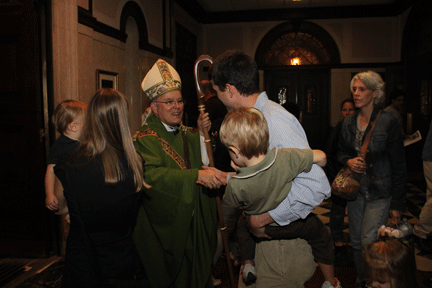On Thursday, Sept. 8, at the Cathedral Basilica of SS. Peter and Paul, before a congregation composed of mostly Church dignitaries, priests, family and friends, Archbishop Charles Chaput formally took possession of his new Archdiocese. On Sunday, Oct. 9, at that same Cathedral Basilica, before a congregation of mostly ordinary people, Archbishop Chaput informally took possession of his new parish.
“It is really good for everyone to have his or her own parish, and mine is the Cathedral,” he told the congregation, promising to continue a custom he established in his former dioceses of Rapid City and Denver, by celebrating a 6:30 p.m. Mass, preceded by confessions every Sunday at the Cathedral, whenever he is in town which he expects will be “95 percent of the time.”
[hotblock]
He invited everyone to come back on succeeding weeks, because “it is awfully silly to have Mass when nobody is there,” he said.
It is held at that late hour, the Archbishop said, because he visits other parishes on Saturday night and Sunday morning.
If you go, the Archbishop warned, his homilies tend to be longer, but if his first homily is any indication, expect a great experience.
“I really enjoyed how he walked us through the Scripture, you can tell he has a great love for Scripture,” said Nathan Stanley, in town from St. Dorothy Parish, Drexel Hill.
During the homily he explained the many layers of meaning of the complementary first and third readings of the Mass(Is. 25:6-10 and Matt. 22:1-14) intelligently but in an engaging down-to-earth style that was cliché-free and kept the congregation’s attention throughout.
Isaiah spoke of the “juicy, rich food and pure choice wine” which the Lord of hosts will provide on His Mountain.
“The feast that God describes in this reading would be unimaginable to the Jews because food was so scarce,” the Archbishop said. He went on to explain the reading is fulfilled “on this holy Mountain, the Church is the new Jerusalem.”
Moving on to Matthew’s Gospel in which the king gives a wedding feast for his son and invited chosen guests, he explained that Christ is the bridegroom at the feast and all of us, male or female. are the bride, just as in other passages of Scripture all of us, male or female, are sons of God.
“Get used to it,” the Archbishop said. “This gender language is not something for us to fight about in the gender wars of our time. It is the way that God explains His relationship to us.”
The heart of that particular Gospel reading is not the feast itself but about who was first invited and who ultimately came, after many of the first invitees rejected the call.
It is really one of the judgment parables.
“These parables tell us each one of us is going to be judged,” Archbishop Chaput said. “Jesus is telling us we are going to be judged.”
But the idea of judgment is not part of our culture, which says “you do what you want to do and I’ll do what I want to do and don’t you dare judge me,” he said.
It is a culture that places toleration as the highest virtue, but in Scripture toleration isn’t listed as a virtue, love is, he explained. “Sometimes we tell people that we love things they don’t want to hear,” he said. “God, who loves us truly, often tells us things we don’t want to hear.”
If exit polls are reliable, Archbishop Chaput is off to a flying start.
“I really enjoyed how he walked us through the Scripture, you can tell he has a great love for Scripture,” said Nathan Stanley, in town from St. Dorothy Parish, Drexel Hill.
Larry Corcoran, of Our Lady of Consolation Parish in the Tacony section of Philadelphia, observed the Archbishop was a great teacher who knows how to hold people’s attention. “I love how he teaches the Scripture to us in a way we never really got before,” he said.
Theresa Belczyk, another Philadelphian who is from Mother of Divine Grace Parish in Port Richmond, felt “the Archbishop reminded us tonight how much God loves us and how we must be prepared to receive Him; just how to be sure we are following all of the invitations He gives us and how we are living the lives He has in store for us.”
As to the length of the homily, she said: “The longer the better if we are having lessons like this.”
PREVIOUS: Annual Hispanic Heritage Mass draws 1,000 to Cathedral Basilica for joyful celebration
NEXT: Presentation BVM students plant pinwheels for peace



I really enjoyed listening to Cardinal Foley’s commentaries from the Vatican during Christmas and Easter, and can never forget the emotion in his voice as he translated the sermon of then-Cardinal Ratzinger at the Funeral of Blessed John Paul II. He was a inspiration to me and am deeply saddened at his loss. May he rest in peace.